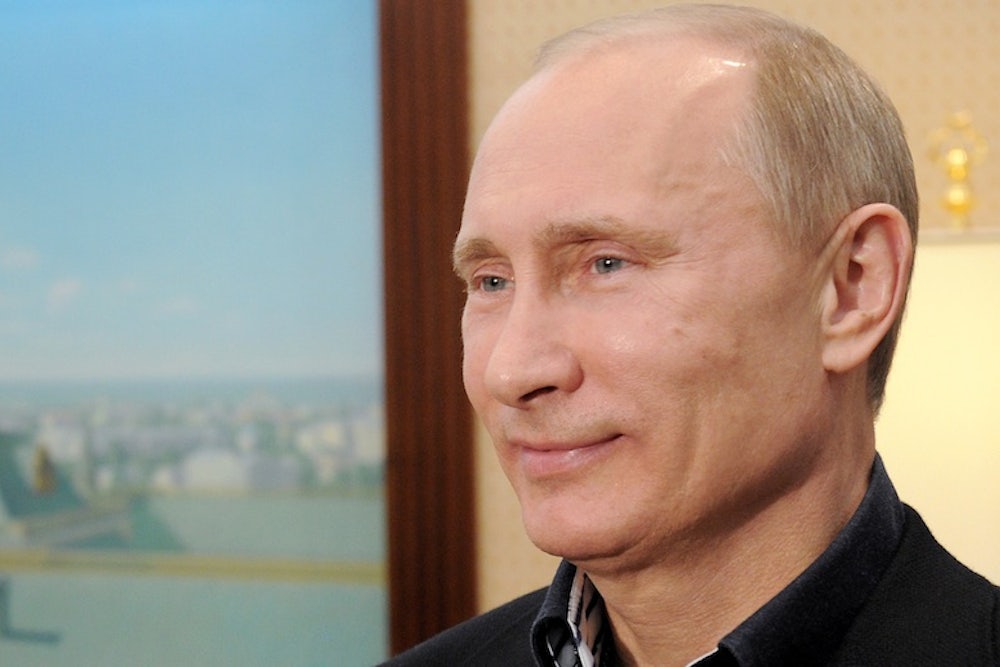Last week, someone on Capitol Hill edited former U.S. Defense Secretary Donald Rumsfeld’s Wikipedia page to describe him as an “alien lizard who eats Mexican babies,” one of several partisan edits that led Wikipedia to institute a 10-day ban on all IP addresses from the U.S. House of Representatives.
Meanwhile, the propaganda war raging over MH17, the Malaysia Airlines flight downed in eastern Ukraine, has also played out on Wikipedia. While Russian government IP addresses have been linked to many politically motivated edits, average Russians are also joining the information war.
Take the example of the SU-25—a Ukrainian fighter jet that the Russian military claimed to have tracked near the Malaysia Airlines' Boeing 777 while the latter was at a cruising altitude of 10,000 meters. RT, the Kremlin-funded news outlet, reported that Russian military units detected the SU-25 ascending toward the plane right before it was shot down near Donetsk. At a press conference at the Ministry of Defense in Moscow, Lieutenant-General Andrey Kartopolov said, “The SU-25 fighter jet can gain an altitude of 10 kilometers, according to its specification.”
That's not true. The SU-25 can only fly to 7,000 meters, according to the manufacturer—and that’s without ordinance. But immediately after the press conference, hundreds of edits appeared on the Russian-language version of Wikipedia, many of which attempted to change the SU-25's maximum operating altitude to 10,000 meters. Some of the IP addresses were traced to Russian government buildings, while many came from random IPs around Russia.
The SU-25 page is one example of many. Almost 7,000 edits have been traced to IP addresses from Russian government buildings—enough to lead to the creation of a twitter account, RuGovEdits, devoted to tracking them. These include edits criticizing former U.S. Ambassador to Russia Michael McFaul for "lacking skills in diplomacy," as well as edits to the Vietnam War page that accentuate the U.S.’s failure. While these are clearly anti-American in nature, the edits are not necessarily motivated by Russian government propaganda policy. “It’s entirely plausible that these revisions are the work of state employees acting on their own, out of genuine interest in ‘setting the record straight,’” Kevin Rothrock, chief editor of Global Voices’ RuNetEcho, wrote in a blog post.
Nonetheless, why didn't the edits traced to the Russian government result in a ban on certain IP addresses, as it did with U.S. House of Representatives?
Wikipedia, by design, reflects the culture that governs it. “Italian Wikipedia may have different policies than Russian Wikipedia, and both may be different than English Wikipedia,” Wikimedia Foundation’s chief communications officer, Katherine Maher, wrote in an email.
Dmitry Rodionov, an administrator and editor of Russian Wikipedia who lives in Germany, has been involved in Russian Wikipedia since February 2006, making him one of the site's most experienced administrators. He told me the website is an “anarchic organism”—that “if you don’t watch it, sooner or later it will collapse.” But there's no real hierarchy of decision-makers, nor is there a Wikipedia-wide protocol for addressing such issues on the site; groups of administrators on each language's version of Wikipedia merely rove around their site, patrolling edits.
Rodionov has corrected some of the most partisan edits made to the MH17 page, and admits to frequently encountering political interference in articles. This includes the SU-25 edit, which he “stumbled upon as an administrator."
“It came to my attention to clean up an article about the SU-25,” Rodionov said in a Skype call from Dortmund. “After the Ministry of Defense’s press conference, which proposed that the Ukrainian SU-25 could fit in this story, many participants, most often people not having experience working with Wikipedia, started to edit the maximum operating ceiling of the SU-25, from seven kilometers, which was there, to ten.”
“It wasn’t one person putting forth his point of view,” Rodionov added, “but a few million people who heard it at a press conference of the Ministry of Defense, and from this a few thousand got angry. They threw themselves into editing this article.”
Recent reports indicate that Kremlin propaganda has been effective enough to spur average Russians into the information war. The Levada Center, an independent research organization based in Moscow, released a poll on Tuesday in which 46 percent of respondents held the Ukrainian Army responsible for the MH17 shootdown. Three percent said separatists were responsible. The existing evidence, such as it is, overwhelmingly points to the rebels—the aircraft was shot down in an area that could only have been reached by a BUK launcher from within separatist-held territory.
Another poll from the Levada Center showed that 91 percent of Russians believe the violence in eastern Ukraine is either due to Western interference or is a reaction to domestic Ukrainian politics, not because of the Russian military's meddling. The propaganda has had its effect: A recent study from the Russian Fund of Fundamental Research found that only 17 percent of young Russians are capable of distinguishing factual reports from propaganda.
It's no surprise that Russian government agencies aren't the only ones editing Wikipedia to cast President Vladimir Putin's authoritarian regime in a more positive light. Most Russians believe the Kremlin's propaganda—many of them to such an extent that they're volunteering as digital soldiers to fight for their distorted version of events. That's infinitely more frightening than any of the absurdities being spouted by Putin himself.
